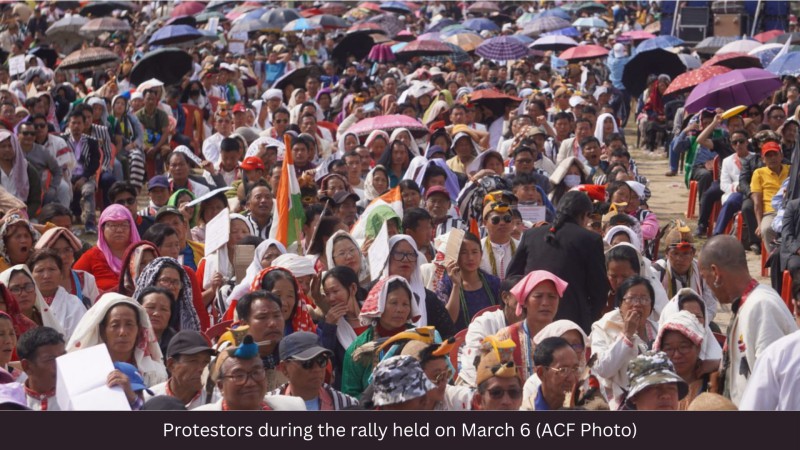Articles
Anti-Conversion Laws: Some Thoughts and Suggestions
Opinion | Articles | Isaac Harold Gomes | 24-Sep-2025

Protest against APFRA in Itanagar

Lately, various church journals have been dwelling on anti-conversion laws (currently prevalent in 12 Indian states) in view of the latest hearing in the Supreme Court of India on September 16, 2025, after a hiatus of two and a half years.
It must be pointed out there is NO National/Central Anti-conversion law in India. To circumvent this, 12 state governments have enacted their own Anti-conversion laws, whereas there is no such law in the eight Union Territories! Euphemistically referred to as “Freedom of Religion Acts,” these laws are designed to prevent or prohibit conversion from one religion to another – basically from Hinduism (79.80%) to Christianity (2.3%) or Islam (14.2%) as per last Census 2011.
Research by US Library of Congress shows that laws restricting religious conversions were:
- Originally introduced in latter 1930s and 1940s by over a dozen princely states
- Aimed to preserve Hindu religious identity in the face of British missionaries.
After India’s independence, Parliament introduced several anti-conversion bills. None were enacted. First, the Indian Conversion (Regulation and Registration) Bill was introduced in 1954, to enforce “licensing of missionaries and the registration of conversion with government officials”. This bill failed to gather majority support in the Lok Sabha. Then in 1960 the Backward Communities (Religious Protection) Bill was introduced. The aim was to check conversion of Hindus to ‘non-Indian religions’ namely Islam, Christianity, Judaism and Zoroastrianism.
PRESENT SCENARIO
At present, 12 states have enacted anti-conversion laws to curb change of religion (from Hinduism to Christianity or Islam) by individuals or groups through inducement, force, coercion or any other fraudulent means. These states are:
(1) Odisha (1967), (2) Madhya Pradesh (1968), (3) Arunachal Pradesh (1978), (4) Chhattisgarh (2000 and 2006), (5) Gujarat (2003), (6) Himachal Pradesh (2006 and 2019), (7) Jharkhand (2017), (8) Uttarakhand (2018), (9) Uttar Pradesh (2020), (10) Karnataka (2022), (11) Haryana (2022) and (12) Rajasthan (2025).
The Rajasthan Legislative Assembly passed the Rajasthan Prohibition of Unlawful Conversion of Religion Bill, 2025 on September 9, 2025. The bill was introduced by the ruling Bharatiya Janata Party (BJP) government in February 2025, but a stricter version was passed in September.
Though Arunachal Pradesh passed the Freedom of Religion Act in 1978, it was never enforced. Arunachal Pradesh chief minister Pema Khandu had in 2018 announced that the Act would be repealed. According to 2011 census, Christianity accounts for 30.26% of Arunachal’s total population, Hindus 29.04%, Sikhs 11.77%, Muslims 1.95% and 26.98% practise other religions. (Source: Northeast Now, 24 February 2021). However, the BJP-led Arunachal Pradesh government is reviving the Arunachal Pradesh Freedom of Religion Act of 1978 and is currently in the process of framing rules for its implementation. To protest the government’s move to revive the four-decade old law, two lakh Christians in Arunachal Pradesh staged a demonstration in Borum on 06 March 2025. Report link: https://www.csw.org.uk/2025/03/14/press/6448/article.htm
It's a million-dollar question whether PM Narendra Modi’s launch of Rs 5,100 crore infrastructure project in Arunachal Pradesh on 22 September 2025 will put a lid on the Christians’ demand for repeal of the 1978 Act. Link: https://www.newsonair.gov.in/pm-modi-launches-₹5100-crore-infrastructure-projects-in-arunachal-pradesh/
CONSTITUTIONAL PROVISION
Article 25(1) “every person has the freedom of conscience and the right to profess, practise and propagate religion”. However, this right does not include the right to convert. Supreme Court of India case Rev Stanislaus Vs State of Madhya Pradesh 1977.
Article 26 guarantees Freedom to every religious denomination, the right to:
- Establish and maintain institutions for religious and charitable purposes.
- Manage its own affairs in matters of religion.
- Own and acquire movable and immovable property.
- Administer such property in accordance with law
Both rights are subject to public order, morality and health.
KEY ASPECTS OF THESE LAWS
Prohibiting Coercion: The primary aim is to prohibit religious conversions carried out under duress, by force, through fraud, or by way of allurement, better lifestyle, divine pleasure (promise of spiritual benefits, a better afterlife, or God's favour on conversion).
Notice Requirements: In most states these laws include provisions for advance notification to the concerned state government (District Magistrate) of one's intent to convert.
Burden-Shifting: Under these provisions, the person accused of forcing or inducing a religious conversion bears the burden of proving that the conversion was legitimate and not carried out by illegal means.
Controversy and Criticism: Critics see it as a blanket restriction on the right to choose or change one's faith and a ploy to target/suppress minorities.
It will be noticed that the basic assumption of these laws is that conversion is mostly done through inducement, force or fraud. Therefore, the respective state governments have fixed the onus on the accused to prove that he/she has not violated the legal provisions. According to these laws “Inducement or allurement” means the offer of any gift or gratification, either in cash or in kind and shall also include the grant of any benefit, either monetary or otherwise. In Haryana Act “Allurement” also means education in a school run by any religious body, divine pleasure (spiritual benefits, a better afterlife, or God's favour as a reward for religious conversion) and better lifestyle.
Himachal Pradesh, Uttarakhand, Uttar Pradesh and Haryana laws place a ban on conversion through marriage. In Uttar Pradesh, this Act is not applicable to one who “reconverts to his/her immediate previous religion.”
CONSTITUTIONAL CHALLENGES
Anti-conversion laws passed in the above states have been challenged in courts. To a plea by the Madhya Pradesh (MP) government challenging MP High Court order, the Supreme Court of India said on 3rd January 2023 “All conversions cannot be said to be illegal”, and that and that every individual has the right to choose their religion. The order restrained the MP government from prosecuting interfaith couples who get married without informing the district magistrate.
On 30th January 2023 Supreme Court conducted a hearing on Anti-conversion cases in various High Courts. On 3rd February, the Court sought responses from UP, MP, Gujarat, Himachal Pradesh, Uttarakhand, Karnataka and Jharkhand governments on petitions challenging the validity of Anti-conversion Acts. Then composite hearing of all these cases lying in different high courts, took place on 17th March 2023. The 16 September 2025 hearing was a sequel to the earlier hearings in 2023. Let’s hope the hearing takes place on a regular basis to put paid to wild allegations of conversions by Christians, where the Catholic Church may not be involved at all.
In the face of the government’s own statistics which state that Christian population has remained constant at 2.3% in both 2001 and 2011 censuses, the Anti-conversion cases against Christians do not hold water. The next census is likely to take place in 2026.
In view of the "essence" of other fundamental rights in Part III (Articles 12 to 35 of the Constitution on Fundamental Rights, which includes the Right to Freedom of Religion - Articles 25-28, and taking into account that there is no National Anti-Conversion Law, the Supreme Court might deem it fit to declare all Anti-conversion laws anti-constitutional.
India is a Secular country where no religion should be given official patronage. In a truly secular country people of different religions and faiths have the freedom to practise and follow their religion without any fear of discrimination. Anti-conversion laws have taken away this freedom and created fear and discrimination.
SUGGESTIONS
- To avoid easy detection, it is advisable to choose Indian names instead of Western names of saints
- Do away with the column/field Religion (nowadays government agencies want details of students from schools, ‘Religion’ being one of the criteria).
- Encourage discreet learning of self-defence in each parish/cluster parishes to thwart extra-constitutional elements and to increase self-confidence.
(The contributor is a member of the Indian Catholic Press Association, a social activist, and a freelance journalist. He writes for different publications on various issues. He can be reached @ isaac25gomes@gmail.com)
Visitor comments
Isaac Gomes
27-Sep-2025
The reason why Anti-Conversion laws have had a stillbirth is because the law itself would be UNCONSTITUTIONAL in view of fundamental rights in Part III (Articles 12 to 35)! But these laws were passed in the 12 states because the Federal System allows states to pass their own state laws. Any state law is subject to challenge in first in the High Courts and then in the Supreme Court, on Constitutional grounds. A way to circumvent these draconian anti-conversion laws is to follow one's conscience in states which do not have such laws. I doubt if there is any provision in the existing laws which prohibits such inter-state exercises (fine adjustments)!
Mr.Bhanu P.M.
27-Sep-2025
Secular Democratic,India,not required anti- conversion law.Then the Secularism itself in at stake. Law can not become for and against at the same time...
Mr Bhanu P. M.
27-Sep-2025
I am very much agree and support,the comments and opinions given by Sr.Gracemary,which are very practical, already posted above.
Sr Gracemary
24-Sep-2025
In a secular democracy like India, the very idea of an anti-conversion law is contradictory. The Constitution guarantees every citizen the right to freedom of conscience and the right to freely profess, practice, and propagate religion. To label these state laws as “Freedom of Religion Acts” is ironic, because in practice they restrict rather than protect religious freedom. The writer rightly points out that there is no national anti-conversion law, and attempts in Parliament have failed. Yet, 12 states have enacted their own versions—primarily targeting conversions to Christianity and Islam. If secularism is truly the foundation of our republic, then legislations curbing personal freedom of belief should have no place in our legal system.
Leave a comment

Alexis Badal Gomes
02-Oct-2025
In India Hinduism 79.80 % are not Disciplined .whereas Islam 14.2 % and Christianity 2.3% are Disciplined. Hinduism 79.80 is suffering from 1. Pride;Egotism;Vanity 2.Jelousy;Envious;Malicious 3.Motified at Another's good 4.Covetous;Act of Greed 5.Overwhelmed with Desire 6.SLOTHFUL 7.LUXURY & ADDICTION 8.GLUTTONY; VORACITY 9.VULGAR ; OBSCENE 10 CHURNING AGITATION The above are the weakness of 79.80 Therefore 79.80 is afraid ???? of 2.3 79.80 can't manage themselves.Because they themselves are suffering from DEVIATION FROM WITHIN ( SPIRITUALY VERY WEAK ) 2.Jealous;Envious;Malicious